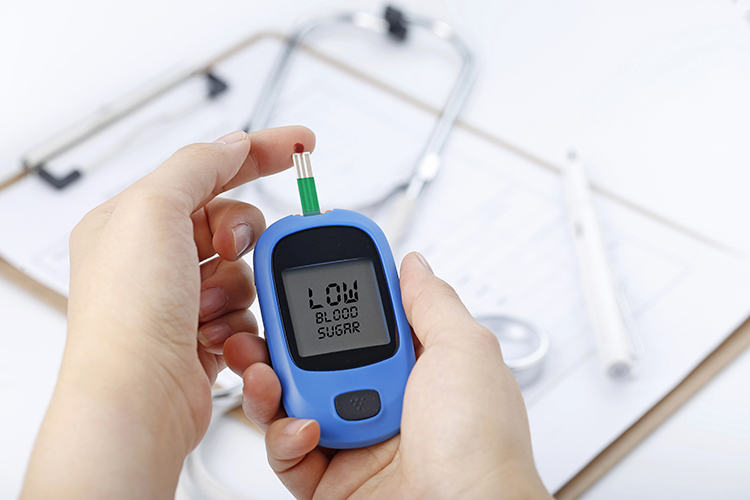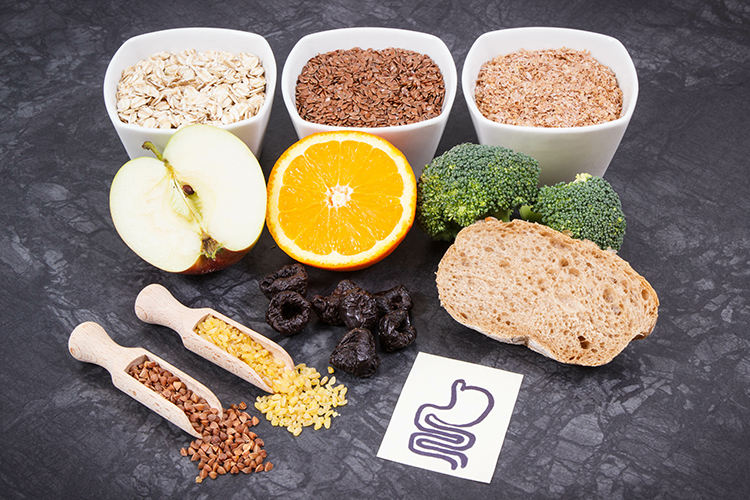The connection between nutrition and mental health is quite technical. Nonetheless, the fact remains that a healthy diet equals a healthy mind. Dietitian, Ilze Roth, tells us more.
“The food you eat can be either the safest and most powerful form of medicine or the slowest form of poison.” – Ann Wigmore
Food provides the nutrients responsible for the energy and essential substances upon which all growth and development, as natural processes indicating progression, and survival depend.1
The traditional definition of nutrition from the study of nutrients in food and the body was extended in literature to include the “study of human behaviour related to food.” Researchers further affirm that nutritional components unrefutably influence certain health conditions, either positively or negatively, based on the diet-behaviour association.2
Scientific evidence across dietary- and nutrition-related research clearly indicates that the intake of food invariably influences the physiological functioning of the body, based on the underlying nutritional status of the individual.2
Importance of nutrition for brain functioning
The brain, as part of the central nervous system, is one of the smallest, yet most complex organs of the human body systems. It regulates your behaviour, perceptions, memories and is responsible for initiating all voluntary movements. The brain is the most metabolically active organ.3 Therefore, it relies on dietary intake for sufficient energy and is highly susceptible to dietary insufficiencies which may negatively impact the structure and function thereof.4
Dietary patterns either deficient or excessive in essential nutrients, negatively affects brain function and as a consequence mental health and behaviour.5
Dietary intake provides nutrients essential for various physiological functions including cell propagation, synthesis of DNA, metabolising hormones and neurotransmitter and are important elements of enzyme systems in the brain.6,2
Nutrition impacts brain function through creating stronger or weaker connections between neurons (known as synaptic plasticity) and influencing the hippocampus which regulates memory.7
The link between the gut and the brain
A study8 explains that the gut and brain link is established by the vagus nerve that originates in the brain stem and travels through the body to the gut, connecting it with the central nervous system. The vagus nerve untangles within the gut and penetrates the gut wall, which is essential in the digestion of food. This intricate connection is imperative to ensure bidirectional communication between the brain and the gut.
Through the gut-brain axis, it’s now possible to understand the impact of nutritional abnormalities on the brain’s functioning as your dietary intake is sensed by the neurons in your gut, sending messages to the brain to alarm the brain.7
Effect of poor nutrition on the brain
A Mahan and Raymond study8 defines human nutrition as “processes whereby cells, tissue, organs and the body as a whole obtain and use necessary substances to maintain their structural and functional integrity.”
Within this context, optimum nutrition can be determined by diet quality, measured by recording food patterns based on their alignment with national dietary guidelines and how diverse the variety of healthy choices is within core food groups or equivalent international groupings.10
Dietary patterns deficient in necessary nutrients, increases the risk of developing non-communicable diseases (NCD).11 A diet high in refined carbohydrates, saturated fat and salt can lead to deterioration in mental capacity and also influence behaviour and increased prevalence of NCDs.4,12
Enjoy a variety of foods
In South Africa, the Food Based Dietary Guidelines addresses poor diet quality and ensure optimum nutrition, physical and mental development, lowered NCD risk, health and well-being through all stages of life.13 The guideline Enjoy a variety of foods promotes dietary diversity as part of a healthy diet, to prevent NCDs.5
A balanced diet is central to support physical health, with scientific evidence propagating the Mediterranean diet as a good model. Evidence from interventional human studies indicates benefits of plant-based diets on individuals, suffering specifically from lifestyle-related diseases, including obesity, Type 2 diabetes, and inflammation.13 It’s therefore believed that a similar diet will be advantageous for optimal development and functioning of the brain.14
Research shows that the typical Western diet (WD) where the dietary pattern resembles a poor-quality calorie-dense diet, laden with saturated fat, refined sugars, sodium, increased consumption of fast foods, and a low intake of vegetables, resulting in low levels of folate, fibre, and omega 3 fatty acids.14,15
Multiple physical and psychological disorders are related to the persistent intake of a WD.16 According to the World Health Organization (WHO), 74% of all deaths globally are attributed to NCDs, including those associated with aging and diseases caused or influenced by the consumption of a WD, such as Type 2 diabetes, overweight, obesity, and cardiovascular diseases.17
The result of these dietary behaviours is not limited to increased prevalence of NCDs, but also deterioration in mental capacity.12 Furthermore, obesity and overweight are independent risk factors for stroke, mild cognitive impairment, and dementias, such as Alzheimer’s disease and vascular dementia.18
Healthy diet, healthy mind
As mentioned previously, researchers recognise the MeD as an eating pattern with the ability to protect against diabetes and to prevent heart disease. The common features include the consumption of nutrient-dense foods, especially encouraging greater amounts of fruit and vegetables, whole grains and omega-3 rich fish, lean meat, low-fat dairy products, nuts and legumes as well as the use of olive oil, canola oil and seed oils.2
Further to the MeD, the Dietary Approach to Stop Hypertension (DASH) diet has similar features and these two dietary approaches were fused to devise the MIND diet (an acronym that stands for the MeD-DASH intervention for neurodegenerative delay).
Recent research suggests that this approach assists in the effective reversing and protection against cognitive decline, thereby (also) reducing the risk of Alzheimer’s dementia.8
The MIND diet
The MIND diet highlights the following 10 groups of foods to include at regular intervals:
- Whole grains
- Green leafy vegetables
- Other vegetables (carrots, peppers and broccoli)
- Nuts
- Berries
- Beans or legumes
- Fish
- Poultry
- Limited wine
- Olive oil
In addition, the MIND diet emphasises five unhealthy food groups that should be minimised in your conquest to optimise brain functioning. These include:
- Pastries and sweets
- Red meat / processed meats
- Cheese
- Fried or fast food
- Margarine
A graphic representation of the MIND diet and the portions and intervals at which the suggested food groups should be taken:19

Figure 1: Graphic representation of the MIND diet.
Conclusion
The improvement of poor-quality diets to combat cognitive decline and optimise brain functioning are thus reliant on the unified and synergistic nature of the diversity of single nutrients which transmutes into healthy dietary patterns.15
Behaviour change is a process and only possible through holistic and interdisciplinary nutritional interventions, considering the factors that influence dietary choice.13,15
References
- Ahmad, F., Hasan, H., Abdelhady, S., Fakih, W., Osman, N., Shaito, A., & Kobeissy, F. 2021. Healthy meal, happy brain: how diet affects brain functioning. Frontiers for Young Minds. [Online]. Available: https://kids.frontiersin.org/articles/10.3389/frym.2021.578214#:~:text=Proper%2C%20healthy%20nutrition%20can%20benefit,number%20of%20connections%20between%20neurons. [2 May 2023]
- Associate Parliamentary Food and Health Forum. 2008. The links betweeen and behavior. The influence of nutrition on mental health, London: The Associate Parliamentary Food and Health Forum. [Online]. Available: https://www.globalwellnessinstitute.org/wp-content/uploads/2018/04/FHF.pdf [20 August 2020]
- Benton, A. 2010. The influence of dietary status on the cognitive performance of children. Molecular Nutrition and Food Research, 54(4): 457-470. [Online].Available: https://onlinelibrary.wiley.com/doi/full/10.1002/mnfr.200900158 [16 August 2020]
- Haapala, E.A., Eloranta, A.M., Venäläinen, T., Jalkanen, H., Poikkeus, A.M., Ahonen, T., Lindi, V. & Lakka, T.A. 2016. Diet quality and academic achievement – A prospective study among primary school children. European Journal of Nutrition, 56(7): 2299-2308. [Online]. Available: doi:10.1007/s00394-016-1270-5 [5 November 2020]
- Hassan, Z.A., Schattner, P. and Mazza, D. 2006. Doing a pilot study: Why it is essential? Malaysian Family Physicians, 1(2-3): 70-73. [Online]. Available: https://www.ncbi.nlm.nih.gov/pmc/articles/PMC4453116/ [2 November 2021].
- Kontis, V., Mathers, C., Rehm, J., Stevens, G.A., Shield, K.D, Bonita, R., Riley, L.M., Poznvak, V., Beaglehole, R. and Ezzati, M. 2014. Contribution of six risk factors to achieving the 25×25non-communicable disease mortality reduction target: a modelling study. The Lancet, August, 384: 427. [Online]. Available:https://www.thelancet.com/action/showPdf?pii=S0140-6736%2814%2960616-4 [28 March 2018]
- Kroner, Z. 2009. The relationship between Alzheimer’s Disease and Diabetes: Type 3 Diabetes. Alternative Medicine Review, 14(4):375. [Online]. Available: https://altmedrev.com/wp-content/uploads/2019/02/v14-4-373.pdf [4 March 2023]
- Mahan, L. & Raymond, J. 2017. Krause’s food and the nutrition care procecss. 14th ed. Missouri: Elsevier.
- Margetts, B and Nelson, M. 2004. Design Concepts in Nutritional Epidemiology. 2nd ed. London: Oxford University Press.
- Medawar, E., Huhn, S., Villringer, A. & Witte, V. 2019. The effects of plant-based diets on the body and the brain:a systemic review. Translation Psychiatry, 9(226): 1-17. [Online]. Available: https://doi.org/10.1038/s41398-019-0552-0 [8 August 2020]
- Millichap, G.J. & Yee, M.M., 2012. The diet factor in attention-deficit/hyperactivity disorder. Pediatrics, 129(330): 330-337.[Online]. Available: http://10.1542/peds.2011-2199 [2 September 2020]
- Naidoo, U. 2020. This is your brain on food. New York: Hachette Book Group.
- Nyaradi, A., Li, J., Hickling, S., Foster, J. & Oddy, W. 2013. The role of nutrition in children’s neurocognitive development, from pregnancy through childhood. Frontiers in Human Neuroscience, 7: 97. [Online]. Available: http://dx.doi.org/10.3389/fnhum.2013.00097 [16 August 2020]
- Rapozo, M. 2022. What is the MIND diet. Pacific Neuroscience Institute. [Online]. Available: https://www.pacificneuroscienceinstitute.org/blog/education/what-is-the-mind-diet/[5 May 2023] Sizer, F.S. and Whitney, E.S. 2017. Nutrition Concepts and Controversies. Boston: Cencage Learning, GL-6, GL-14.
- Steyn, N. & Ochse, R. 2013. “Enjoy a variety of foods”: as a food-based dietary guideliine for South Africa. South African Journal of Clinical Nutririon , 26(30: S13 – S17.
- Tappenden, K.A., 2017. Krause’s Food and the Nutrition Care Process. In: Krause’s Food and The Nutritional Care process. 14th ed. Missouri: Elsevier, pp. 1-16.
- Tortoro, G and Derrickson, B. 2017. The brain and cranial Nerves. In: Tortora’s Principles of Anatomy and Physiology. Singapore: John Wiley & Sons, Inc., pp. 417-444.
- Vorster, H.H., Badham, J.B. & Venter, C.S. 2013. An introduction to the revised food based dietary guidelines for South Africa. South African Journal for Clinical Nutrition, 26(3): S5-S11.
- Wirt, A. & Collins, C.E. 2009. Diet quality – what is it and does it matter?. Public Health Nutrition, 12(120): 2473 –2492. [Onlilne]. Available: https://www.cambridge.org/core/journals/public-health-nutrition/article/diet-quality-what-is-it-and-does-it-matter/9E51F4F8539F8F5681F2EA4F0A2F74F3 [2 September 2020]
- World Health Organization. 2020. Non-communicable diseases. [Online]. Available at: https://www.who.int/news-room/fact-sheets/detail/noncommunicable-diseases [24 November 2020].

MEET THE EXPERT
Ilze Roth is a registered dietitian. She believes in a multi-disciplinary approach to treatment and has a special interest in the gut-brain interaction, healthy eating practice in children, mental health, sports-nutrition, wholesome lifestyle management and oncology.
Header image by FreePik












